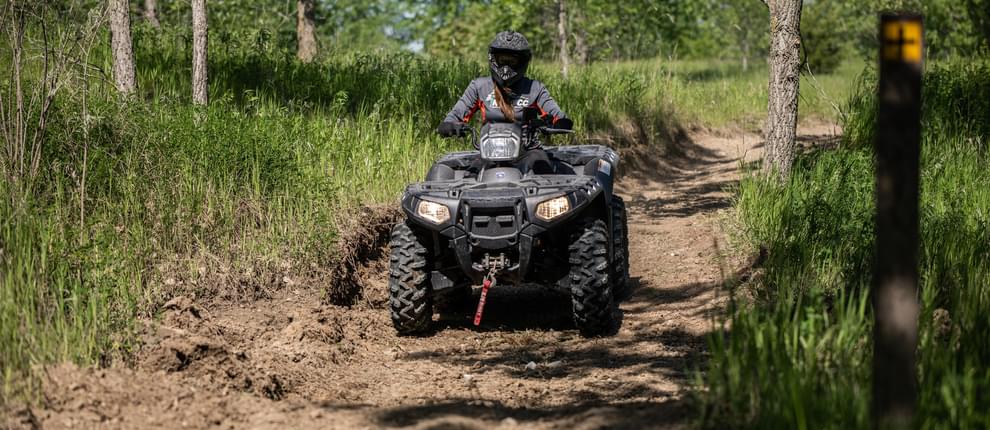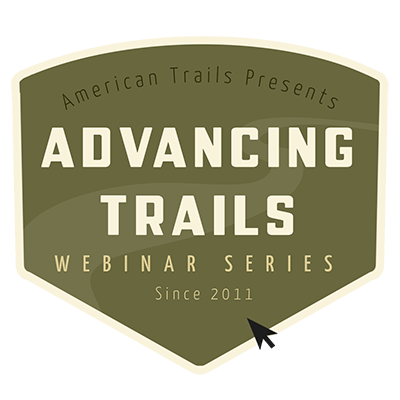




Subscribe to our mailing list for notifications on our latest trainings.

Learn from two case studies how former industrial sites were turned into trail destinations.
Presented by:
** This event has passed **
February 04, 2021
10:00 AM to 11:30 AM (Pacific Time) {more time zones}
Cost (RECORDING):
FREE for membersNote:
Closed Captioning is available for this webinar.
Learning Credits are available for this webinar.
This webinar is free. Would you consider a donation to support this webinar?
This webinar is free to the public, thanks to a generous sponsorship from South Carolina Department of Parks, Recreation, and Tourism.

Learn from two case studies how former industrial sites were turned into trail destinations.
Iron Range Mountain Bike Destination Project, Minnesota
The Iron Range Mountain Bike Destination Project is a collaborative community development project along northern eastern Minnesota’s Iron Range, a roughly 90-mile long ridge that has been heavily mined for more than 100 years. Predictably, a mining-focused economy provided numerous boom-bust cycles over the years that hinder resiliency and quality of life in the many small communities along the range. The MN Department of Iron Range Resources and Rehabilitation (IRRR) invests resources to enhance livable communities, maximize collaborations and partnerships, and strengthen businesses and worker education. Noting the economic redevelopment success around other natural surface trail systems, IRRR invested $5M for three trail systems, one at each end of the range along with a centrally located system. The paved Mesabi Trail provides trail connectivity between each natural surface system. With an ambitious 3-year construction plan, more than 80 miles of mountain bike-optimized trails literally sprung from the ground on top of historic mine tailings piles and adjacent to deep, clear mining pit lakes which had been previously unmanaged or barred public access.
To successfully complete a project of this magnitude on such a compressed timeframe, project partners had to clear substantial hurdles related to public access and safety, state contracting, securing quality construction and project management, and logistics. The webinar presenters will discuss these challenges, how they were overcome, the near-instant positive community impacts, and how the onset of post-construction collaboration and community management of these innovative destination trail systems.
Gypsum City OHV Park, Webster County, Iowa
The Gypsum City OHV Park started with a humble beginning of rider-created trails on trespassed lands, but it has turned into one of the premiere OHV riding areas in the country. Needing to find a solution to the problem for the gypsum mining companies, a group of riders and the Iowa Off-Highway Vehicle Association looked from within to find the cure. Partnerships were formed from grassroots advocacy to include riders; city, county, and state governments; and the mining companies which owned the land. That same commitment to excellence has been applied repeatedly as each phase of the park came together and additional land was added to the park boundary.
A master plan was developed that focused on sustainability for the park and trails that were professionally designed and built. The park is 800 acres and has three phases for riders to find the riding experience they want. The largest phase of the park has designated trails for each type of OHV allowed to operate at the park. There are tracks designed for off-road motorcycles for riders to challenge their skills, as well as a kids track so that their skills can be practiced and developed in a safe environment. The park features a state-of-the-art campground which was designed to accommodate larger hauling equipment and space to store the camper's OHVs at their camp site. While there were stumbles along the way with getting the park up and running, Gypsum City OHV Park serves as a model for the development of motorized recreational opportunities all across the country.

This webinar qualifies as a Health, Safety, and Welfare (HSW) course (via LA CES).
Scott Linnenburger, Principal, Kay-Linn Enterprises
Boulder, Colorado

Scott Linnenburger has more than 15 years of experience in recreation/trail development, conservation planning, and environmental restoration projects. His successful management of more than 175 projects in the federal, state, local, and private sectors demonstrates a keen ability to assist clients in developing projects that fulfill their mission, protect natural resources, and enhance community sustainability. Scott has served on the Board of American Trails and the Professional Trailbuilders Association. Scott has a Masters of Environmental Management from Duke University’s Nicholas School, with a focus on wetland/stream ecology, restoration, and habitat planning.
James (Jim) Plummer, Planner, Minnesota Department of Iron Range Resources & Rehabilitation

For 14 years James (Jim) Plummer has been the Planning Director for Iron Range Resources and Rehabilitation, which is an economic development agency in Northeast Minnesota. He is responsible for a variety of activities including the Regional Trails grant program, property development at the Giants Ridge Recreation Area and other agency project sites. Jim is the Mineland Vision Partnership Coordinator, and is involved in numerous community and business development projects.
Plummer received a Bachelor of Arts Degree in Political Science and English from the University of Minnesota, and a Masters of Arts Degree in Urban and Regional Studies from Mankato State University. He began his career working for the cities of Apple Valley and Hastings in their planning departments, and worked 18 years for the St. Louis County Planning Department. Plummer has three wonderful children and enjoys snow and waterskiing, MTB biking, weight training, traveling, and spending time at the cabin on Lake Vermilion.
Pete Kero, P.E., Senior Environmental Engineer, Barr Engineering Company

Pete Kero is a professional environmental engineer with Barr Engineering Company and co-founder of the Iron Range Off-Road Cyclists (IROC) non-profit mountain bike club in Northeastern Minnesota. Starting in 2008, Pete worked to transform an idled iron ore mine pit in Chisholm, Minnesota into a destination-quality mountain biking venue. The Redhead Mountain Bike Park, which opened to the public in June 2020, has already attracted tens of thousands of mountain bikers and hikers and has rapidly become considered one of the best natural-surface trails in the Great Lakes region. Pete’s roles in the project included the initial visioning, site selection, conceptual trail design, landowner agreements, funding requests, environmental studies and permitting, risk management plans, mapping and sign design. Pete’s work also includes design assistance, mapping and environmental review and permitting for the Tioga mountain bike trail in Cohasset, Minnesota and the Giants Ridge mountain bike park in Biwabik, Minnesota.
Rhonda Fowler, OHV Program Manager, Iowa Department of Natural Resources (OHV)

Rhonda Fowler is the OHV Program Manager for the Iowa Department of Natural Resources. She has been with the DNR for 13 years working with the OHV and snowmobile programs. The best part of her job is working with the volunteer clubs that make the OHV parks in Iowa possible. With Iowa having less than 2% public land, unique challenges for expanding motorized recreational opportunities exist, but from adversity comes innovation and new partnerships. Rhonda serves on the Executive Board of the International Off-highway Vehicle Administrators Association where important collaboration addresses OHV-related issues in a broader context.
Natasha (Tasha) Nielsen, Natural Resource and Trail Technician, Webster County Conservation

Tasha Nielsen is the Natural Resource and Trail Technician for Webster County Conservation in Iowa and has spent her time with the day-to-day operations at Gypsum City OHV Park since 2014. Tasha was born in Minnesota, but moved to Fort Dodge, Iowa when she was twelve and now considers Iowa home. She has been around OHVs most of her life and enjoys the challenge of learning to operate new off-highway vehicles and other equipment. In addition to motorized recreation, Tasha also enjoys hunting, ice fishing, kayaking, golf, and generally being outdoors.
Dan Kleen, President, National Off-Highway Vehicle Conservation Council (NOHVCC)

Dan Kleen is the President of the Board of Directors National for Off-Highway Vehicle Conservation Council (NOHVCC). He has been on the NOHVCC Board for 24 years serving as President for the past 21 years. He helped establish the Iowa Off-Highway Vehicle Association (IOHVA) in 1987 and has represented the IOHVA as their Vice-President, President, Lobbyist, Executive Director and is currently the Public Relations Director. In 2005, Dan formed the Iowa Motorsports Coalition. He has served on Iowa’s Federal RTP advisory committee for over 25 years.
Dan is also a founding member of the Friends of Iowa’s Trails group who sponsor the annual Iowa Trails Summit. After a diving accident in the mid-80’s, Dan was left wheelchair bound. The accident didn’t stop Dan from enjoying outdoor recreation. He is still an avid hunter and has turned to OHVs and other forms of motorized mobility to get into the great outdoors. Dan has been instrumental in setting up disabled hunts and rides for our disabled veterans in his home state of Iowa as well as in other states.
We are offering closed captioning for our webinars, thanks to a partnership with VZP Digital. If you are in need of this service, please email us prior to the webinar. An unedited transcript will be sent to all attendees following the webinar.
American Trails is proud to be a certified provider of the following learning credits and continuing education opportunities:
Learning credits are free for attendees for American Trails webinars and the International Trails Symposium, as well as for other conferences, webinars, and workshops we offer credits for. Learn more here.
While we may individually agree (or disagree) in whole or in part with any or all of the participants, the views expressed in these webinars are not necessarily representative of the views of American Trails as an organization or its board and staff. Unless specific situations are noted by presenters, nothing in American Trails webinars should be considered to be interpreted as a standard.
By registering for our webinars, you submit your information to the webinar organizer and associated presenters and sponsors, who may use it to communicate with you regarding this event and their other services. Your organization may also be added to the American Trails Business Directory. You can easily cancel your registration at any time.
4,215 views • posted 12/22/2020
